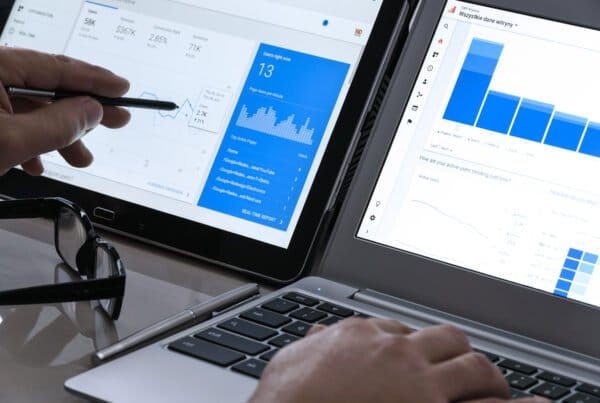“No matter how great your offer might be, a weak, poorly positioned, un-optimized, or ill-designed landing page will kill conversions.”
Landing Pages Defined
Web pages designed for one specific action or goal that typically utilize a call to action (CTA) which encourages the visitor to fill out a form, download a product, make a purchase, or take some other action are typically known as Landing Pages. Since your landing pages are where visitors go to make decisions within your sales funnel, it’s important to make these pages as user-friendly as possible.
Here are some actions and specific components of a landing page you or your marketing team can focus on to maximize the impact of these pages and help distinguish them from the regular web pages on your website.
Maximizing Keywords
Keywords are more than just words that define your corner of the market. They need to be placed strategically in landing page titles and text, as well as ads and other marketing campaigns. The foundation of SEO revolves around keywords, so you need to make sure that your landing page keywords match what search engine users are already searching for.
But make sure you do not overuse keywords, which can be just as damaging as neglecting them. Search engines penalize sites that try to flood text with keywords. This comes across as unnatural and would be unappealing to visitors. Therefore search engines will not rank pages well if they are being optimized for search and not for people. Just make sure to use keywords enough to make it clear they are important to your business. Most importantly, concentrate on telling your story. Use SEO, ads and social sharing to send followers to specific landing pages beyond your home page.
Keyword research before ever developing content is critical too. You may want to consult with an SEO expert for keyword research or someone who specializes in landing page optimization services to find the best possible keywords for your page.
Use Share Buttons and Other CTAs
The “share button” has become one of the most common “call to action” tools for online businesses. Use share buttons if your landing page already:
- contains compelling text and images that others might share or find interesting
- gets to the point (you don’t want to share pages that are a waste of time… people remember those type of shares and are less likely to click next time)
- is not filled with clutter which would confuse the visitor (also goes back to getting to the point!)
- actually presents a solution, product, or service that is of value to the audience
Landing page optimization specialists often study Analytics to learn how well your CTAs are working and which ones generate the most traffic. This process often takes time a great depth of understanding and knowledge to make effective marketing decisions.
Depending on the type of page or offer, making social share buttons obvious at the top of your landing pages is important, but there may be other places that can increase leads and conversions. Utilizing landing page optimization services instead of making these assumptions on your own can be a huge benefit to getting conversions on these pages.
Keep in mind, the more your audience shares your pages, the more Google will view them as important or relevant and will often rank them much higher in the search results.
Gaining Trust through Useful Content
Landing pages need to be more than just a photo and basic description. To give customers what they are looking for, you need to provide more in-depth information that educates the visitor or peaks their interest to take the next step. Some typical ways a landing page can generate more interest and retain a visitor longer would be to include further content additions such as:
- links to Q&A pages or FAQs built right into the landing page
- an email address, inquiry form, or live chat feature to help field further questions
- a customer service phone number
- links to social media pages
- video demonstrations of products
- customer testimonials
- a bulleted list of features or benefits gained by using the product, service, or offer
Certain communication can build trust online, such as offering to pay for shipping or a particular clarification about a product or service that may not be known at first glance.
Failing to disclose important information upfront such as added shipping, handling, or processing fees, can drive potential customers away quickly. Especially if they only learn of the added costs during the final step of checkout or purchase. They will feel slighted for not having known sooner which will lead to a quick exit from your site, probably never to return.
Remember, there are more than enough alternative choices consumers can make, so do not give them a reason to look elsewhere.
Make Your Images Count
If all your pages contain text and nothing more because you don’t have access to a camera that takes high resolution photos, then you definitely need help. If all your photos look dark, fuzzy, amateur or pixelated, that’s another sign you need to turn to professionals.
All your images need to have a sharp, crisp, and colorful appearance. While modern smartphones can deliver high resolution photos, a marketing team offering landing page optimization services will likely have access to the best possible photographic equipment to make sure your images are eye-catching. Many also have access to stock photography (online libraries of images for purchase often related to your type of product or service).
Think about both conceptual imagery as well as product-related imagery. While snapping a photo of your product might not even make sense if it is virtual or non-tangible, think about how the product makes the customer feel or what problem it solves. Most products and services provide a solution to a problem, so often, an image which supports this concept can help support the landing page effectively.
If you are selling a product that photographs well, invest in a photoshoot with a local photographer. Even if there are “generic” or similar versions of your product already online, taking photos of your product and using those for your landing page will help improve buyer confidence and improve your brands awareness. If you choose to use generic or misleading images consumers will certainly complain and even let others know your product is falsely advertised.
A/B Testing Is a Must
A/B testing enables you to compare or evaluate the performance of one landing page against another similar page. Often, while testing there is minimal difference between the two other than a headline, photo, keyword variation, content writing style, etc. This way, by only creating minor variations between the two pages it’s much easier to determine why one page converts higher over another.
Without A/B testing, your site will rely on hope and guesswork to determine what will lead to more conversions on your landing page. Website optimization experts utilize A/B testing to continuously experiment with keywords and landing page elements to find the best mix which seems to convert higher for your unique market position.
Once a formula or winning strategy begins to emerge, you can take this concept and repeat across all relevant landing pages for your website.
Information Collection
Many landing pages are built to collect information. Often this information is used for gaining access to subscriptions, free offers, downloads, newsletters, scheduling a consultation, or inquiring about a particular product or service.
Depending upon where in your sales funnel a visitor might be, asking for too much information too soon can be a turn-off. What you collect should be commensurate with what is given in return. For example, if they merely wish to subscribe to your blog or are downloading a free eBook, do not go overboard.
Often during this “awareness” stage where the visitor just wants to learn a bit more, asking for non-personal information such as their first name and an email address should be enough. We suggest limiting the information collection to perhaps 3 or 4 items max. For example, we often collect name, email, zip code (to understand more about where our audience is located) and have them choose what their biggest marketing challenge might be from a drop down menu. Most visitors feel comfortable providing this level of information in exchange for more content or information.
Security is a hot button issue for online consumers so any additional concerns they might have regarding the information you are trying to collect could lead to less buyer confidence and affect conversions on your page. If you do not need confidential or more personal information, do not ask for it until it is appropriate to do so. Be respectful and put yourself in the customer’s shoes when asking for information.
How Landing Page Specialists Can Help
Website professionals are trained in creating the best end-user experience possible. This is especially the case for your landing pages which need to consider the following three critical components to remain effective and beneficial for your website:
- Evergreen content – your landing page as well as the product or service offered must be developed so that it stays current and relevant for your audience. Landing pages are meant to do the selling for you and the only way this continues to happen is if the content provided and the offer remain important to your audience.
- Optimized for mobile devices – a landing page or website that does not consider mobile traffic as a priority will hurt sales as more than 50% of internet traffic is now coming from mobile users.
- Consistent design and brand experience – if landing pages do not represent the product, service, or overall brand image, it creates a disconnect for consumers and lowers overall buyer confidence.
Marketing specialists are often needed to help with landing pages, since most website owners do not have the time to invest themselves. And no matter how well you know your business or your target customer, taking this insight and turning it into a useful, engaging, and action-oriented landing page is more than likely not your strong suit. Landing page specialists will utilize their vast expertise to identify landing page issues or concerns that may lead to lack of conversions.
Consumers expect the best. They are looking for the optimal product or service available, and typically at the best price as well. And, it is an indisputable fact that consumers today search online to find this ideal solution for their needs. Often what they are looking for or discover during their search, cannot even be found in brick and mortar stores. Plus, selling online opens your business to working with customers nationwide or even globally. Your landing pages must appeal to consumers most likely to buy what you are selling.
A consumer revolution is underway. With so many options available to buyers, a company’s ability to “influence” or “convince” consumers to choose them has become much more difficult.
To put it frankly, customer’s today see through the bullshit.
If your product or service sucks but you try to spin it otherwise, your customers will hold you accountable and probably make sure all their friends are aware of this too. This means you can either stand out by empowering consumers with a great product or service, delivered through a powerful landing page full of honest, useful information or you can blend in with all the other easy to overlook sites that do not offer anything special.
Also consider the other problem plaguing businesses selling through their website: no matter how great your product or service might be, a weak or poorly positioned, un-optimized, or ill-designed landing page will kill conversions.
If your landing pages suck or your product sucks you’ve got a problem!
Consider speaking with online marketers who specialize in landing page optimization services to help identify potential issues which are lowering conversions, traffic, or buyer confidence.
Oh, and by the way… we can help. If you want to discuss or need help with your website’s inbound lead generation we would be happy to analyze your site, provide some free insight, and explore opportunities for improving your marketing strategy overall. Connect with us today.












